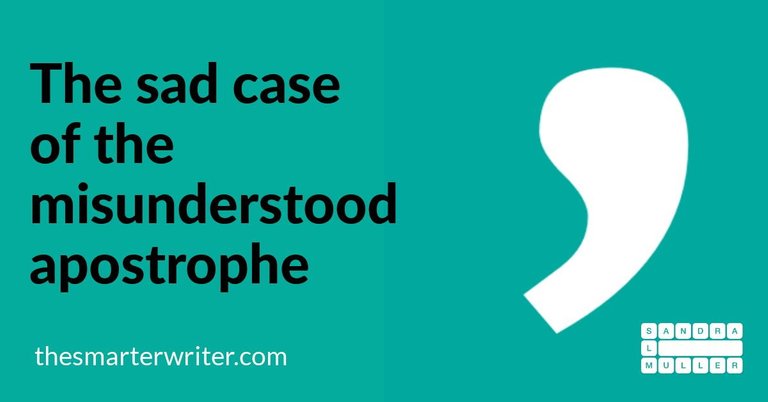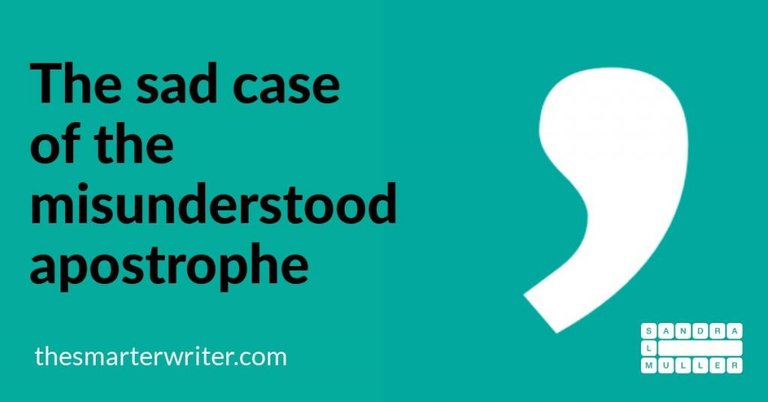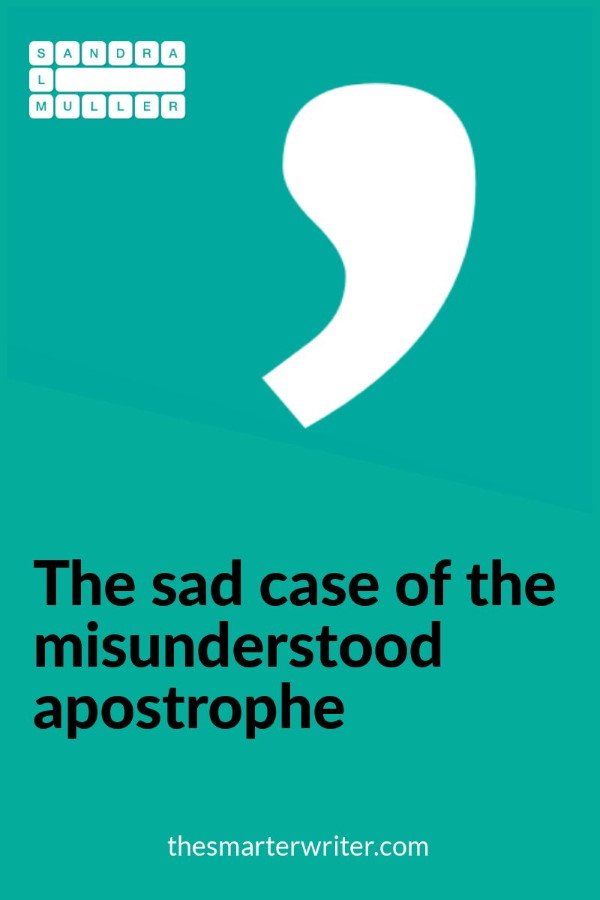

You may have seen a sad little article doing the rounds across social media recently about the Apostrophe Protection Society closing. Its founder, John Richards, has given up the good fight. He's also 94 and has better things to do with the rest of his life than be a grammar pedant.
The sad little apostrophe might be the verge of extinction, but I like the little signal it sends to help me decipher a word's meaning and intention.
The apostrophe is an often misunderstood and overlooked critter. Yet for such a small mark, it has a big meaning. It tells us so much in this 1 small signal.
To keep John's good fight going, here's a reminder about when and how and when not to use an apostrophe.
Sometimes people use apostrophes incorrectly and sometimes not at all. So let's take a refresher on apostrophe use.
Apostrophes and possessives
We use apostrophes to show that something belongs to someone or something.
✔️ The zombie's desire for brains drew it to the cowering child.
✔️ A zombie slayer's stake pierced the eye of the zombie.
Phew! Lucky child.
That's a straightforward example of apostrophe use. It gets a little less straightforward when we use apostrophes with plurals to show ownership.
✔️ The zombies' path through town caused mayhem.
Here we're talking about more than one zombie. We're talking about a group of zombies and the path they take through town. Pesky zombies. We add the apostrophe after the S that shows it's a plural.
✔️ The slayers' plans were not strategic and the town fell to zombies.
Again, placing the apostrophe after the 'S' shows that we're talking about more than one slayer. Silly slayers. I hope that kid is OK.
It's even less straightforward when the word that needs an apostrophe ends in the letter S when it's not a plural. In that case, it depends on your style guide. Both sentences are correct:
✔️ The bus's wheels ran over the zombie with less impact than a speed hump. Squelch.
✔️ The bus' wheels ran over the zombie with less impact than a speed hump. Squelch.
If we're talking about more than one bus and the word ends in 'ES'? We had the apostrophe after the ES.
✔️ The buses' wheels ran over the zombie.
❌ The buses's wheels ran over the zombie.

Pin it to read later
Possessive pronouns and apostrophes
I thought of an interesting case with possessives where we don't use apostrophes.
Ah, bless the English language, right? There are always exceptions.
We don't use apostrophes for possessive pronouns.
Possessive pronouns are words like its, hers, yours, ours, etc.
But we do use apostrophes for indefinite pronouns like somebody's pitchfork or no one's stake or everybody's running for the safe house.
Apostrophes and contractions
When we shorten (or 'contract') a word by taking letters out, we use an apostrophe to show that there are missing letters. For example:
✔️ Do not becomes don't
✔️ You are becomes you're
✔️ Would have becomes would've
✔️ Will not becomes won't
✔️ You all becomes y'all
Easy peasy, right? Sure, until we get to the its vs it's confusion.
Its vs it's
This one trips people up. If I didn't have ProWritingAid installed on my computer and in my browser, I'd mess this one up all the time, too, because it's so easy to miss.
'It's' is a contraction. It means it is.
'Its' is a possessive pronoun.
For example:
✔️ The zombie snagged its leg on the broken fence. It's stuck.
In the first sentence, 'its leg' indicates possession, so we don't use an apostrophe because it's a possessive pronoun. We're talking about the leg that belongs to the zombie. The second sentence uses an apostrophe to indicate a contraction for 'it is'.
Sometimes an easy way to check if you should write 'it's' is to write it out like this:
❌ The zombie snagged it is leg on the broken fence.
✔️ It is stuck.
The first sentence doesn't make sense. No apostrophe for you. The second sentence does. You get an apostrophe.
When not to use apostrophes
I often see apostrophes when referring to a decade, like the 1950s.
✔️ Zombie movies became popular in the late 1960s after the release of George A Romero's Night of the Living Dead.
❌ Zombie movies became popular in the late 1960's after the release of George A Romero's Night of the Living Dead.
I also see people using apostrophes with plurals:
❌ Zombie movie's became popular...
Or with verbs:
❌ The zombies see's the child climbing the fence.
Why it's important to use apostrophes correctly
This post might sound like I'm a grammar pedant. But I'm generally not.
When I see apostrophes used incorrectly and I'm annoyed, it's not because I'm being all judgey judgey and a condescending prat. It's just that it takes my brain an extra second or 2 to process the writer's intent and re-interpret the sentence.
The incorrect use of apostrophes adds to my cognitive load and slows down my reading while I mentally correct the mistake and figure out the writer's intent. And that's what I don't like about it. Always keep your readers in mind. Give them a smooth reading experience.
Apostrophes mean something. They are not arbitrary symbols.
Each apostrophe is a little signal that tells my brain it represents a plural or possession. Mixing them up or not using them at all, can change the meaning of your words.
Are you on Team Apostrophe or Team Dont Care? [Before you scold me, the lack of apostrophe was intentional. Did I make your eyes twitch?]
For weekly tips, explanations and zombie exploits like this, sign up for my newsletter.
Posted from my blog.
Congratulations @sandramuller! You have completed the following achievement on the Steem blockchain and have been rewarded with new badge(s) :
You can view your badges on your Steem Board and compare to others on the Steem Ranking
If you no longer want to receive notifications, reply to this comment with the word
STOPTo support your work, I also upvoted your post!
Vote for @Steemitboard as a witness to get one more award and increased upvotes!